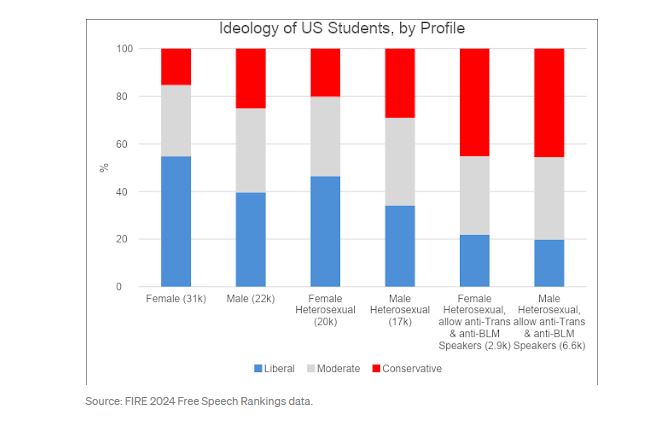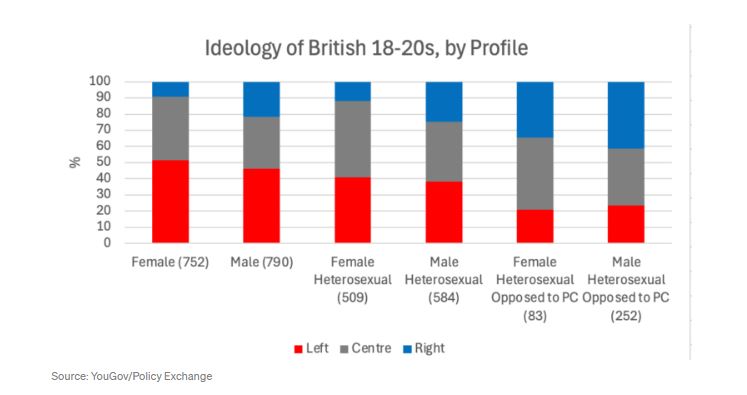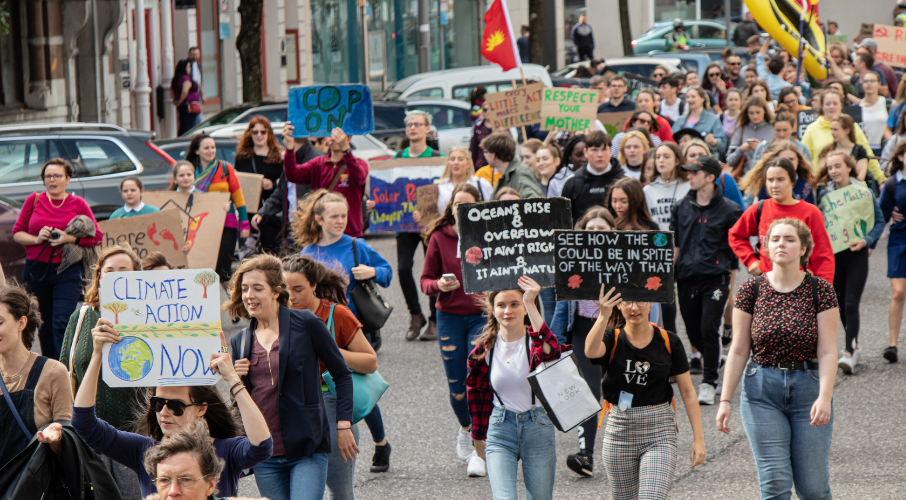This article originally appeared in UnHerd.
By Eric Kaufmann, April 3, 2024
A new article in the Times, drawing on Financial Times and Economist data, finds a growing youth political gender gap. I beat them to it in these pages, but no hard feelings: it’s a trend that deserves attention. And while Andrew Tate isn’t exactly the best role model, today’s young men haven’t moved Right. Instead, the story is about young women in Western countries moving in the opposite direction, specifically because they have become more socially progressive.
The timing of the new female progressivism, taking off in the early-to-mid 2010s, coincides with the rise of the social media-smartphone nexus, when apps such as Instagram and TikTok soared in popularity. This has been associated, as Jonathan Haidt notes in his recent book, The Anxious Generation, with a surge in mental illness — especially among young women. At the same time, there has been a jump in the share of young people — again, more female than male — identifying as LGBT. Finally, this marched in lockstep with a veritable explosion of campus no-platformings and campaigns to fire professors for speech deemed offensive to progressive sensibilities.
What Matthew Yglesias and Zach Goldberg term the “Great Awokening” emerged during the same period, with the share of white liberal Americans describing racism as a major problem rising from 35% in 2011 to over 80% by 2020, while remaining flat among white conservatives. As radicalisation took place on the Left, the Right remained broadly stable. Goldberg shows that increased public concern tracked growing media attention to “Critical Social Justice” themes, first on trendsetting sites such as Buzzfeed, then in mainstream outlets such as the New York Times. All this took place simultaneously in Britain and other Western societies.
This “Awokening” is central to the gender gap now widely observed. To show why, I have examined two datasets. The first is the Foundation for Individual Rights and Expression (FIRE) 2024 campus free speech survey (conducted in 2023), which polls a massive 55,000 students, mainly in top-200 US universities.
The chart below shows that the 31,000 female students in the survey (nearly all aged 18-22) lean 55% liberal to just 15% conservative, whereas the 22,000 male students lean liberal by 40% to 25%. A possible reason for the gap is that 32% of female students are lesbian, bisexual or queer, while just 20% of males are. If we focus only on heterosexual students, women go from 55-15 to 46-20, narrowing the gender gap somewhat.

Yet what eliminates the gap entirely is factoring in attitudes to no-platforming speakers who offend disadvantaged groups. A belief system which demands the sacralisation of historically marginalised identity groups inclines people to prioritise group protection from offensive words over a person’s right to free speech.
Nevertheless, as the chart above shows, there are over twice as many male students who would tolerate such speech as female (6600 vs 2900). Narrowing only to free speech supporters who are heterosexual, there is no longer a statistically significant gender gap (women lean Right 45-22 vs. men at 46-20).

We find something similar in the UK. Data in the chart above comes from a 2022 YouGov survey I conducted of 1,500 British 18-20-year-olds, including both students and non-students. Women tilt left 51-9, while men do so 46-22. Women are more likely to be gay or bisexual than men. If we narrow to heterosexual opinion the gap shrinks a bit, as it did in the FIRE data.
Yet the big change comes when I focus only on those who oppose political correctness (PC). There are three times as many men as women in this category, but among anti-PC youth there is no statistically significant ideological gender gap. Women are also far more likely than men to favour transwomen entering women’s spaces, sports and shelters.
It is clear, then, that the “Great Awokening”, not women’s interests, explains the political gender gap.
Eric Kaufmann is Professor at the University of Buckingham and a Senior Fellow with the Macdonald-Laurier Institute, he is author of the upcoming Taboo: Why Making Race Sacred Led to a Cultural Revolution (Forum Press UK, June 6)/The Third Awokening: A 12-Point Plan for Rolling Back Progressive Extremism (Bombardier Books USA, May 14).





